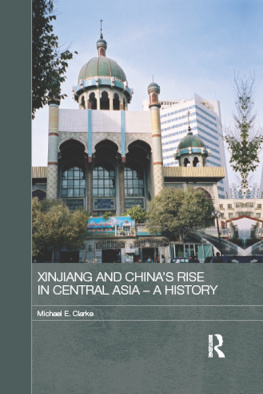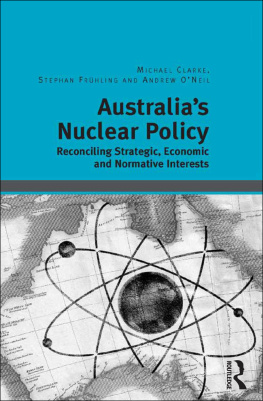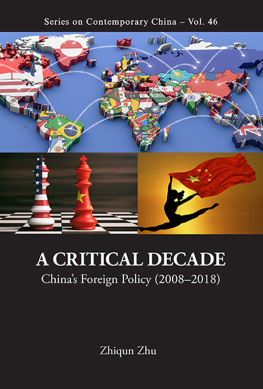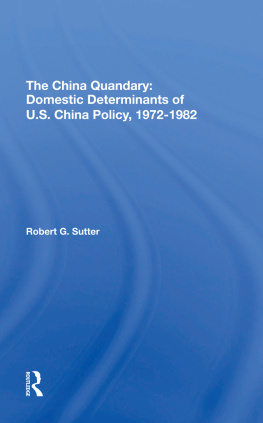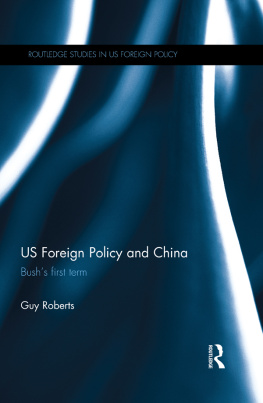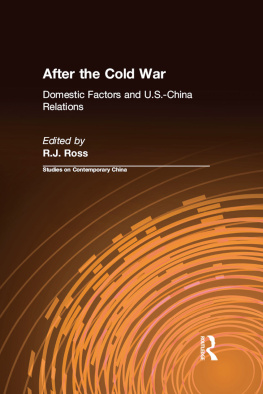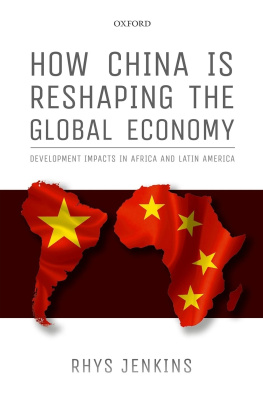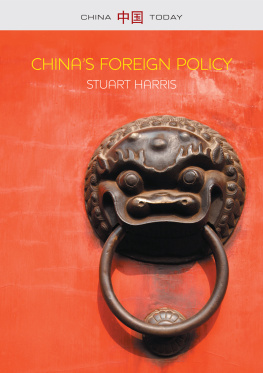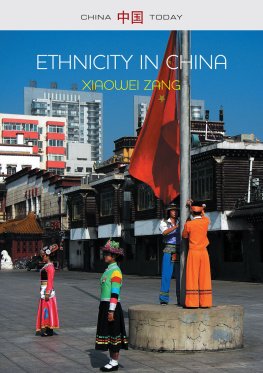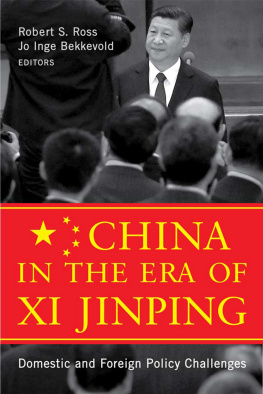Michael E. Clarke is Associate Professor at the National Security College, Crawford School of Public Policy, Australian National University, Canberra. He has published extensively on the history and politics of Xinjiang, Uyghur separatism, nationalism and terrorism, Chinese foreign policy in Central Asia, Australian foreign and defence policy and global nuclear proliferation and non-proliferation dynamics. He is the author of Xinjiang and Chinas Rise in Central Asia: A History (2011) and (with Stephan Frhling and Andrew ONeil) Australias Nuclear Policy: Strategic, Economic and Normative Dimensions (2015).
Douglas Smith is Lecturer in International Relations, School of Government and International Relations, Griffith University, where he teaches and researches twentieth-century Chinese history, politics and economy. His research focus is on democratization and political reform in the early Republican era and Australia-China relations. Two of his most recent publications are: The Debate over Chinas Economic Reform: Bears and Bulls, in E. Van Acker and G. Curran (eds), Government and Business in Volatile Times (2013); and (with Michael E. Clarke) The Song Remains the Same: Converging Views on a Rising China, in M. Heazle, M. Griffiths and T. Conley (eds), Foreign Policy Challenges in the 21st Century (2009).
China's Frontier Regions explores how China's policy towards its internal peripheries critically structures its emerging foreign relations and new regional frameworks. Whether it be security, economy or identity, the contributions emphasize the centrality of frontier regions in the formulation of Beijing's internal and foreign priorities, and how discussions of seemingly geopolitical topics like plans for a New Silk Road and China's new great power status cannot be removed from them.
Alexander A. Cooley, Director, Harriman Institute, Columbia University
CHINAS FRONTIER
Ethnicity, Economic Integration and
Foreign Relations
Edited by
M ICHAEL E. C LARKE AND D OUGLAS S MITH
This book is dedicated to the memory of Marisa Olga Clarke and her lifelong passion for learning.
Published in 2016 by
I.B.Tauris & Co. Ltd
London New York
www.ibtauris.com
Copyright selection and editorial matter 2016 Michael E. Clarke and Douglas Smith
Copyright individual chapters Michael E. Clarke, Elizabeth Davis, Sean R. Roberts, Gary Sigley, Douglas Smith, Sharad K. Soni, Tsering Topgyal
The right of Michael E. Clarke and Douglas Smith to be identified as the editors of this work has been asserted by the editors in accordance with the Copyright, Designs and Patents Act 1988.
All rights reserved. Except for brief quotations in a review, this book, or any part thereof, may not be reproduced, stored in or introduced into a retrieval system, or transmitted, in any form or by any means, electronic, mechanical, photocopying, recording or otherwise, without the prior written permission of the publisher.
References to websites were correct at the time of writing.
International Library of Human Geography 33
ISBN: 978 1 78453 258 1
eISBN: 978 0 85772 945 3
ePDF: 978 0 85772 742 8
A full CIP record for this book is available from the British Library
A full CIP record is available from the Library of Congress
Library of Congress Catalog Card Number: available
CONTENTS
Michael E. Clarke and Douglas Smith
Sean R. Roberts
Michael E. Clarke
Elizabeth Davis
Tsering Topgyal
Sharad K. Soni
Gary Sigley
NOTES ON CONTRIBUTORS
Elizabeth Davis is Professor in the Division of Liberal Arts and International Studies, Colorado School of Mines. She has lived and worked in Asia for many years. Initially, her academic research focused on China. She has previously held professorial appointments at SAIS, Johns Hopkins University and the Asia Pacific Security Studies Centre, Honolulu. Professor Davis has also worked extensively for the US Government on issues related to preventive diplomacy in Asia, including working with Nepalese officials during the transition from monarchy to representative democracy. Simultaneous with these on-the-ground projects, she has maintained a rigorous academic agenda that includes briefing US senators and congressmen, top US military officers, and foreign government officials on issues related to China and Asia. Her most recent publication is Ruling, Resources and Religion in China (2012).
Sean R. Roberts is Associate Professor of the Practice of International Affairs and Director of the International Development Studies Programme at George Washington University, Washington DC. He has conducted extensive ethnographic fieldwork among the Uyghur people of Central Asia and China and has published extensively on this community in scholarly journals and in edited volumes. In addition, he has produced a documentary film on the community entitled Waiting for Uighurstan (1996). In 19982000 and 20026, he worked at the United States Agency for International Development (USAID) in Central Asia on democracy programmes, designing and managing projects in civil society development, political party assistance, community development, independent media strengthening and elections assistance.
Gary Sigley is Associate Professor in Asian Studies, University of Western Australia, Perth. Contemporary China and its ongoing social, cultural and political transformation form the broad focus of his research. More specifically, his research interests can be split into two areas: governmental and social policy reform in contemporary China on the one hand, and cultural heritage and community development on the other. His most recent publication is From Revolution to Government, From Contradictions to Harmony: Urban Community Policing in Post-Deng China, in Randy Lippert and Kevin Walby (eds), Policing Cities: Urban Securitization and Regulation in a 21st Century World (2013).
Sharad K. Soni is Professor and Director, Area Studies Programme, Centre for Inner Asian Studies, School of International Studies, Jawaharlal Nehru University, New Delhi (India). He specializes in Chinese Central Asian Studies with particular focus on the history, politics and international relations of Mongolia as well as Tibet and Inner Mongolia autonomous regions of China. He has published extensively across these fields in scholarly journals and in edited volumes. He is also the author of six books, the most recent ones including Mongolia in the 21st Century: Society, Culture and International Relations (2010) and Mongolia Today: Internal Changes and External Linkages (2015).
Tsering Topgyal is Lecturer in International Relations, Department of Political Science and International Studies, University of Birmingham. His research interests and expertise include Chinese foreign and security policy with special attention to its ethnic conflicts, Asia-Pacific security and politics, Sino-Indian relations and Sino-Tibetan issues. He is the author of China and Tibet: The Perils of Insecurity (2016).
PREFACE
This book is the end product of a process that began with a small workshop organized by the China Policy Group of the Griffith Asia Institute in July 2013. The workshop, titled China at the Edge: Border Movements of Markets, People and Ideas, focused primarily on Xinjiang and Yunnan and explored the changing nature of these frontier provinces under the People's Republic of China (PRC). Of particular concern for participants was to track the ways in which both the central government and provincial authorities had begun to reimagine or reconfigure the roles of these frontiers both within a domestic and foreign policy setting since the end of the Cold War. Historically, the Chinese imagination understood these provinces as the edge of civilization. Consequently both had been frequently conceived as


